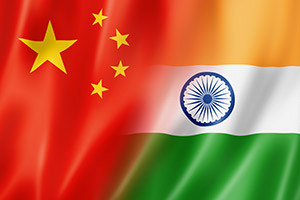It’s on — environment, health, science, global affairs
UC Berkeley plans a full calendar of events this fall; see Part 3 of our coming attractions series

August 31, 2016
From the impact of climate change to the rise of new political superpowers to engineered human health, events on campus this fall explore what the future may hold for our world.
Environment
An esteemed professor of civil and environmental engineering, Ashok Gadgil, will discuss the largest mass poisoning in recorded history – arsenic-contaminated drinking water. Professor Gadgil’s research focuses on solving global issues related to development, and he is the inventor of new technologies such as the Berkeley-Darfur stove and UV Waterworks (Thursday, Sept. 15, 5 p.m., 10 Stephens Hall).

Robert F. Kennedy Jr., Thursday, Oct. 27
Robert F. Kennedy Jr. will visit campus to discuss our environmental legacy. He will examine the role that natural resources play in our work, health and American identity, and what we can do to protect and preserve our planet (Thursday, Oct. 27, 7 p.m., International House auditorium).
The value of forests will be the focus of a talk by Heather Tallis, chief scientist of the Nature Conservancy. She will discuss proactive possibilities for managing our forest resources, and what emerging research tells us about the value of trees (Friday, Sept. 30, 4 p.m., Clark Kerr Campus Krutch Theater).
Dawn Kooyumijan master gardener, arborist and staff horticulturist at Blake Garden, will offer a workshop on drought-tolerant garden design (Saturday, Sept. 17, 10 a.m., 315 Wurster Hall). John Dennis, landscape architect for San Francisco Public Works, will give his perspectives on the tactical moves required to improve our civic landscapes (Saturday, Oct. 15, 10 a.m., 315 Wurster Hall).

Drought-tolerant garden design, Saturday, Oct. 15
Students and the campus community can find out about local organizations, campaigns, projects, internships and funding opportunities available for those with sustainability interests at the Sustainability Involvement Expo (Wednesday, Sept. 14, noon, Lower Sproul Plaza).
Science

Rainer Weiss on gravitational waves, Monday, Oct. 3
Rainer Weiss, a professor at the Massachusetts Institute of Technology, will discuss the recent discovery of gravitational waves – predicted by Albert Einstein 100 years ago – as researchers begin to explore its implications (Monday, Oct. 3, 6 p.m., Zellerbach Auditorium).
Google’s Deep Dream, a platform that transforms photographs using artificial-intelligence algorithms, will be the subject of a lecture by Mike Tyka, who established the program. Tyka’s work focuses on the intersection of biochemistry with computer simulation software (Monday, Nov. 28, 7:30 p.m., Sutardja Dai Hall Banatao Auditorium).
Health
What is the future of engineered health? Robert Langer, a world-renowned bioengineer and professor at MIT, will present breakthroughs in health sciences including the development of controlled drug delivery systems to the foundation of tissue engineering. He will also share his insights on what we can expect looking ahead (Friday, Dec. 2, 4 p.m., 105 Stanley Hall).

Robert Langer, Friday, Dec. 2
The explosion of prescription opioid misuse and heroin abuse has created a serious public health problem in America related to addiction, overdoses and premature deaths. H. Westley Clark, a professor of public health at Santa Clara University, will present community-based solutions to address these issues (Thursday, Sept. 15, 4:30 p.m., UC Berkeley Extension San Francisco Campus, 160 Spear St., Room 608).
Influential psychoanalyst Christopher Bollas will examine the role of mental pain and its role in human psychic development. Should mental pain be suppressed with medication, or is there more we can learn by embracing it? (Tuesday, Nov. 1, 5 p.m., Morrison Library).
The campus will host an annual full-day conference focused on new findings in the fields of ophthalmology, optometry, biology, neuroscience and computer vision. Bay Area Vision Research Day brings together top researchers from the UC system and private research institutions (Monday, Sept. 12, 9 a.m., Alumni House).
Global affairs
Die Zeit journalist Wolfgang Bauer visits campus for an engaging roundtable discussion of his recent books: Crossing the Sea, which documents the stories of Syrian refugees as they flee to Europe, and Stolen Girls, chronicling the fates of the Nigerian school girls kidnapped by Boko Haram (Tuesday, Sept. 20, noon, 3335 Dwinelle Hall).
The global network of human trafficking and sex slavery is the subject of the film, Trafficked, by Blum Center fellow Siddharth Kara. The award-winning film was inspired by real characters (Friday, Nov. 4, 6 p.m., Sutardja Dai Hall Banatao Auditorium).

Discussion of “The Other Slavery,” Wednesday, Oct. 5
A system of bondage that was as terrible, degrading and vast as African slavery targeted the native people of the Americas, yet it is virtually unknown. Andres Resendez, professor of history at UC Davis, will discuss his book, The Other Slavery, which describes the enslavement of Native Americans throughout the Western Hemisphere (Wednesday, Oct. 5, 4 p.m., Wildavsky Room, 2538 Channing Way).
In the coming years, China and India will become two of the world’s indispensable powers – whether they rise peacefully or not. India and China will have vetoes over many international decisions, including climate change, global trade, human rights and business standards. Anja Manuel, formerly of the U.S. State Department, will discuss the future with new global superpowers (Thursday, Oct. 6, 5 p.m., 223 Moses Hall).

The future of China and India, Thursday, Oct. 6
Vivienne Shue, of Oxford University, will explore political change in China by examining meticulous and futuristic land-use mapping of China’s nation-space, which is now incorporated as a central component of the nation’s comprehensive development planning (Tuesday, Nov. 15, 4 p.m., Faculty Club Heyns Room).
Also see:
Coming attractions Part 1 – Race, gender and politics in America
Coming attractions Part 2 – Arts, authors and visual expression
To explore more Berkeley events, visit the Critic’s Choice calendar or sign up for weekly event emails.